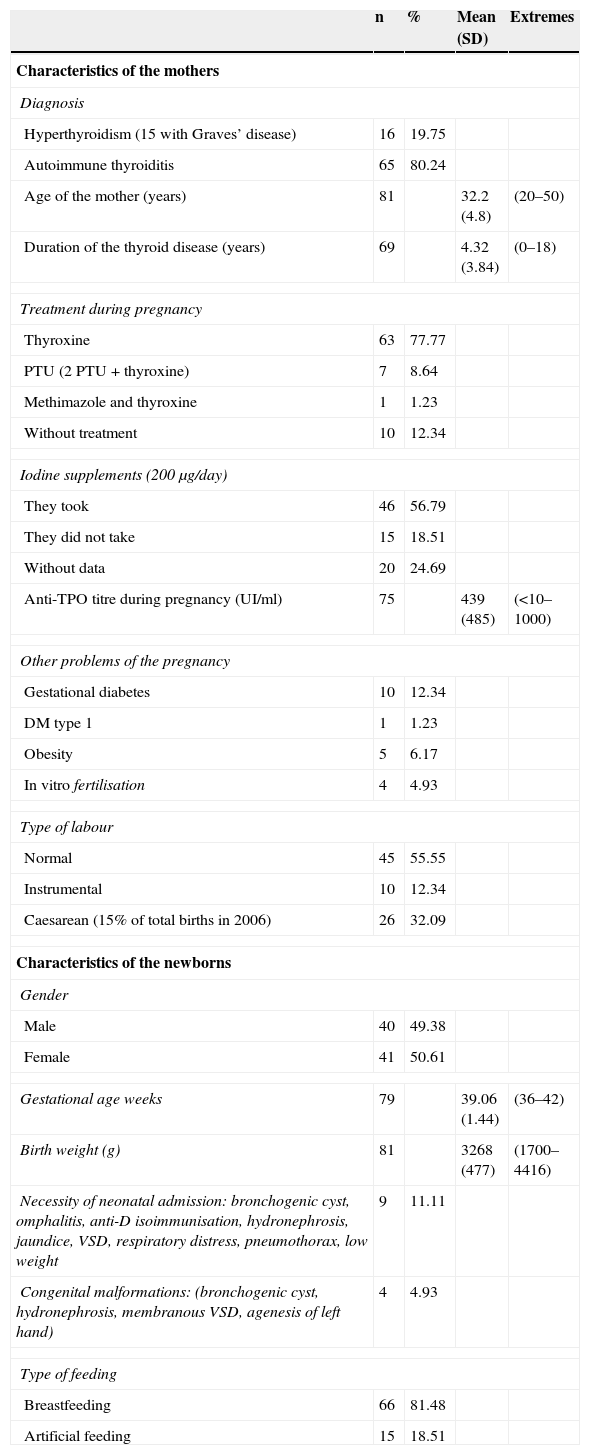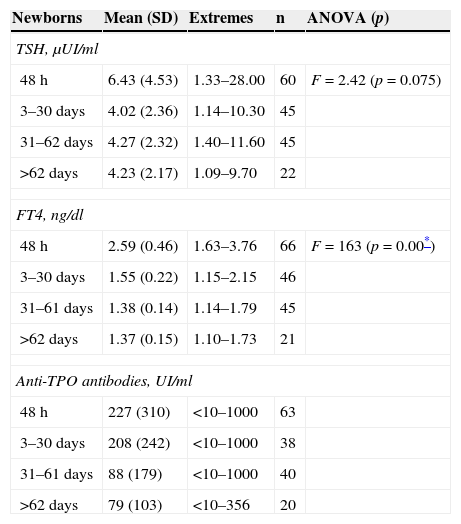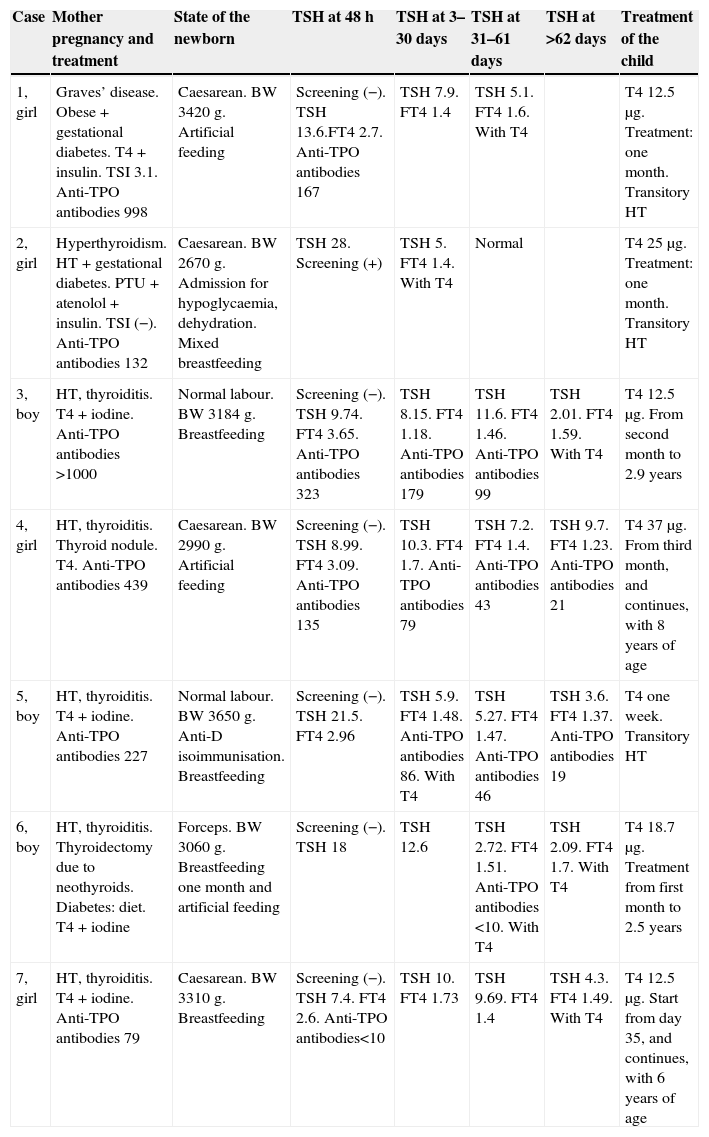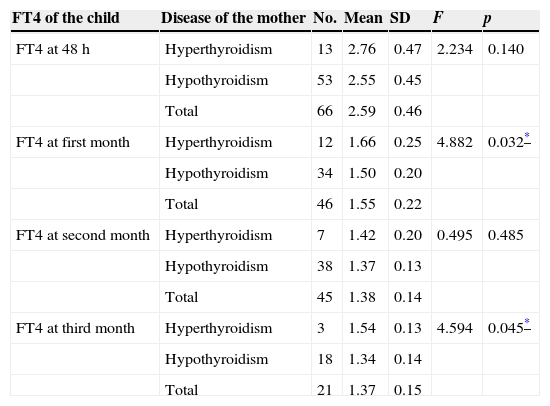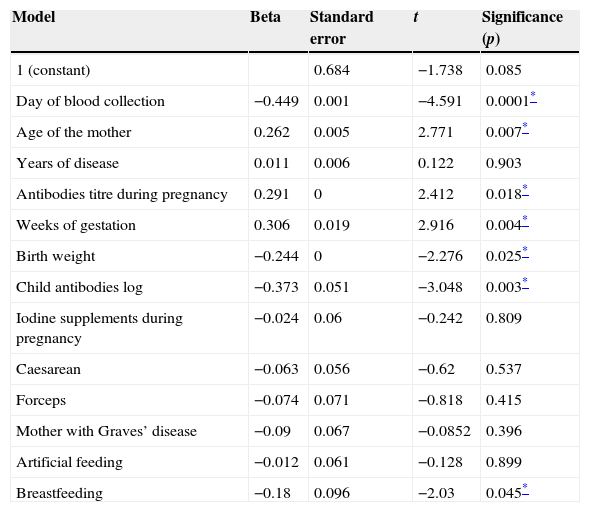Autoimmune thyroid disease is amongst the most frequent endocrine disorders during pregnancy. It is associated with an increase in perinatal morbidity, congenital defects, neurological damage, foetal and neonatal thyroid dysfunction. Maternal thyroid hormones play a key role in child neurodevelopment. We aimed to evaluate the thyroid function and the clinical course of neonates born from mothers with autoimmune thyroid disease during the first months of life in order to define the follow-up.
Patients and methodWe monitored thyroid function and clinical status during the first months in 81 newborns of mothers with autoimmune thyroid disease; 16 had Graves disease and 65 autoimmune thyroiditis.
ResultsA percentage of 4.93 newborns had congenital defects, and 8.64% neonates showed an increase in thyrotropin (TSH) (>9.5μUI/mL 2 times) and required thyroxin within the first month of life. A 85.7% of these showed a negative newborn screening (due to a later increase of TSH). A higher TSH value in the newborn was related to an older age of the mother, higher levels of thyroid peroxidase (TPO) antibody during pregnancy and lower birth weight. A higher free thyroxine (FT4) value in the newborn was related to fewer days of life and mothers with Graves disease.
ConclusionsWe recommend the evaluation of TSH, T4 and TPO antibodies before 10 weeks in all pregnant women with follow-up if maternal thyroid autoimmunity or disorders is detected. It is also recommended to test children's serum TSH and FT4 at 48h of life in newborns of mothers with autoimmune thyroid disease and repeat them between the 2nd and 4th week in children with TSH>6μUI/mL. Careful endocrine follow-up is advised in pregnant women and children if hyperthyroidism is detected.
La enfermedad tiroidea autoinmunitaria es uno de los problemas endocrinológicos más frecuentes del embarazo. Se asocia a mayor morbilidad perinatal, malformaciones, daño neurológico y disfunción tiroidea neonatal. Las hormonas tiroideas maternas son claves en el neurodesarrollo fetal. Evaluamos la función tiroidea, en los primeros meses, de los hijos de mujeres con enfermedad tiroidea autoinmunitaria, para intentar establecer el seguimiento óptimo.
Pacientes y métodoSe controló la función tiroidea, durante los primeros meses, en 81 hijos de mujeres con enfermedad tiroidea autoinmunitaria (16 casos de hipertiroidismo y 65 de tiroiditis autoinmunitaria).
ResultadosEl 4,93% de los neonatos presentaron malformaciones, y el 8,64% recibieron tiroxina por un valor de tirotropina (TSH) comprobada mayor de 9,5μUI/ml en el primer mes. En el 85,7% de estos, el cribado neonatal fue negativo, por un aumento tardío de la TSH. Se asoció a TSH elevada en el niño: menor peso al nacimiento, mayor edad materna y mayor título de anticuerpos antiperoxidasa tiroidea (anti-TPO) en la gestación. Se asoció a una tiroxina libre (T4L) más alta en el niño: tener menos edad y que la madre tuviera hipertiroidismo.
ConclusionesSe recomienda determinar en todas las gestantes los valores de TSH, T4 y anticuerpos anti-TPO antes de la semana 10, y seguimiento o tratamiento si hubiera alteraciones. Asimismo, se recomienda controlar a las 48h de vida la TSH y la T4L en hijos de mujeres con enfermedad tiroidea autoinmunitaria y, si la TSH fuera mayor de 6μUI/l, repetir el control entre las semanas 2-4. Es recomendable efectuar un control cuidadoso de la gestante con hipertiroidismo y de su hijo.
Artículo
Comprando el artículo el PDF del mismo podrá ser descargado
Precio 19,34 €
Comprar ahora






